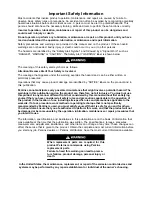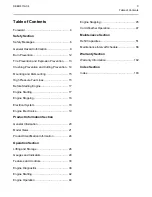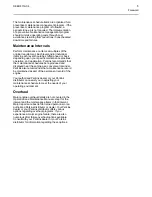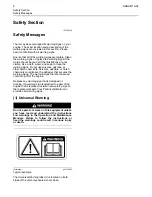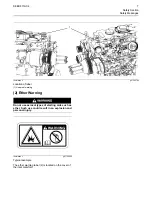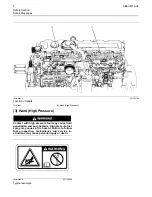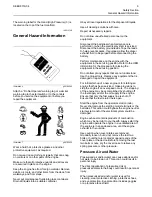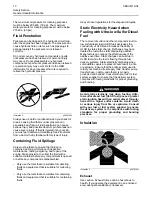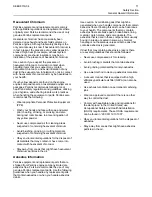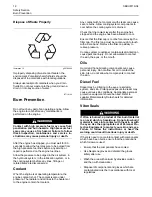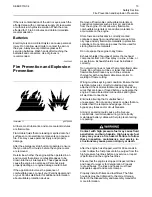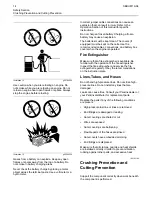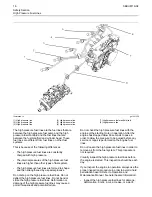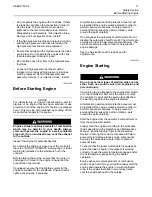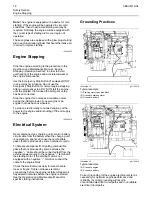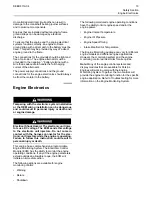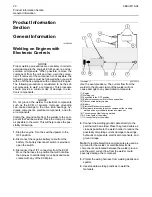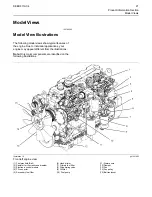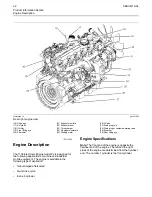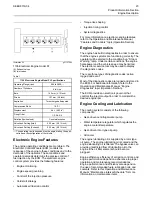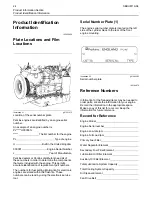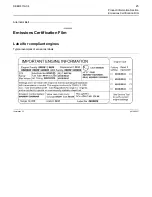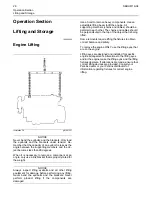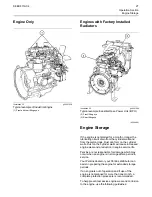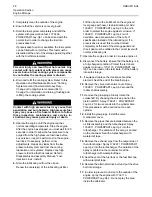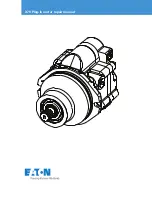
If there is contamination of the skin or eyes, wash the
affected area with a continuous supply of clean water
or with calcium hydroxide solution. Wash the area
effected for 15 to 60 minutes and obtain immediate
medical attention.
Batteries
Electrolyte is an acid. Electrolyte can cause personal
injury. Do not allow electrolyte to contact the skin or
the eyes. Always wear protective glasses for
servicing batteries. Wash hands after touching the
batteries and connectors. Use of gloves is
recommended.
i04823662
Fire
Prevention
and
Explosion
Prevention
Illustration 11
g00704000
All fuels, most lubricants, and some coolant mixtures
are flammable.
Flammable fluids that are leaking or spilled onto hot
surfaces or onto electrical components can cause a
fire. Fire may cause personal injury and property
damage.
After the emergency stop button is operated, ensure
that you allow 15 minutes, before the engine covers
are removed.
Determine whether the engine will be operated in an
environment that allows combustible gases to be
drawn into the air inlet system. These gases could
cause the engine to overspeed. Personal injury,
property damage, or engine damage could result.
If the application involves the presence of
combustible gases, consult your Perkins dealer and/
or your Perkins distributor for additional information
about suitable protection devices.
Remove all flammable combustible materials or
conductive materials such as fuel, oil, and debris
from the engine. Do not allow any flammable
combustible materials or conductive materials to
accumulate on the engine.
Store fuels and lubricants in correctly marked
containers away from unauthorized persons. Store
oily rags and any flammable materials in protective
containers. Do not smoke in areas that are used for
storing flammable materials.
Do not expose the engine to any flame.
Exhaust shields (if equipped) protect hot exhaust
components from oil or fuel spray in a line, a tube, or
a seal failure. Exhaust shields must be installed
correctly.
Do not weld on lines or tanks that contain flammable
fluids. Do not flame cut lines or tanks that contain
flammable fluid. Clean any such lines or tanks
thoroughly with a nonflammable solvent prior to
welding or flame cutting.
Wiring must be kept in good condition. Ensure that all
electrical wires are correctly routed and securely
attached. Check all electrical wires daily. Repair any
wires that are loose or frayed before you operate the
engine. Clean all electrical connections and tighten
all electrical connections.
Eliminate all wiring that is unattached or
unnecessary. Do not use any wires or cables that are
smaller than the recommended gauge. Do not
bypass any fuses and/or circuit breakers.
Arcing or sparking could cause a fire. Secure
connections, recommended wiring, and correctly
maintained battery cables will help to prevent arcing
or sparking.
Contact with high pressure fuel may cause fluid
penetration and burn hazards. High pressure fuel
spray may cause a fire hazard. Failure to follow
these inspection, maintenance and service in-
structions may cause personal injury or death.
After the engine has stopped, wait for 60 seconds in
order to allow the fuel pressure to be purged from the
high-pressure fuel lines before any service or repair
is performed on the engine fuel lines.
Ensure that the engine is stopped. Inspect all lines
and hoses for wear or for deterioration. Properly
route all hoses. The lines and hoses must have
adequate support and secure clamps.
Properly install oil filters and fuel filters. The filter
housings must be tightened to the correct torque.
Refer to the Disassembly and Assembly manual for
more information.
SEBU8119-04
13


